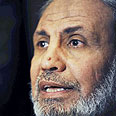
Hamas leaders emerge after 4 months underground
'We will never recognize the enemy in any way, shape or form,' al-Zahar says during first public appearance since Israeli offensive in Gaza; Haniyeh condemns 'Israeli attempts to instigate disputes between Arab countries and resistance movements'
Two top Hamas leaders made their first appearances at public events since Israel's Gaza war on Friday, signaling defiance of rival Palestinian President Mahmoud Abbas as he discussed peace prospects with a US envoy.
"We cannot, we will not, and we will never recognize the enemy in any way, shape or form," Mahmoud al-Zahar, one of the two leaders, said in a mosque sermon broadcast on the Islamist movement's radio station, referring to Israel.
Ismail Haniyeh, who heads the Hamas administration in Gaza, spoke at another mosque. As a precaution against assassination, both men had gone underground during a 22-day offensive Israel launched on Dec. 27 to counter Palestinian rocket fire. Their rare statements since have been mostly in pre-recorded speeches.
The Ma'an news agency quoted Haniyeh as saying following prayers at a mosque in Ash-Shati refugee camp that he was "deeply concerned over the media crisis between Egypt and Hizbullah" and that "Hamas respects the stability of Arab nations, as their security is part of Palestinian security."
"Palestinian and Lebanese resistance movements that defend land and holy sites should be respected by the Arab countries," the Hamas leader said, adding that he hopes the tensions in Egypt "will not affect their continued support to the Palestinians."
He called on both sides to stay focused on the "big issues, such as Jerusalem and Al-Aqsa," Ma'an reported.
Haniyeh condemned "Israeli attempts to instigate disputes between Arab countries and resistance movements."
According to the report, he also spoke favorably of ongoing Palestinian unity talks with the Fatah movement, but said that "outside intervention and pressure has prevented us from reaching an agreement."
Haniyeh also updated the crowd on the status of captured IDF soldier Gilad Shalit, saying that "we have nothing new on this issue."
Noting that Friday was Prisoners Day, Haniyeh said "You (Palestinians imprisoned in Israel) are going to be free soon; we will not give up on your freedom."
In the West Bank, where Abbas' secular Fatah faction holds sway, the Palestinian president met US President Barack Obama's Middle East envoy George Mitchell.
Mitchell is sounding out Abbas and Israel on the possibilities for Palestinian statehood despite long-running Fatah-Hamas tensions and a new right-leaning Israeli government that has shown little appetite for ceding West Bank land.
'Focus on security and economic matters'
In meetings with Israeli leaders on Thursday, Mitchell stressed Obama's commitment to the goal of a two-state solution, "in which a Palestinian state is living in peace alongside the Jewish state of Israel", ending the decades-old conflict.
"That is our objective. That is what we will pursue vigorously in the coming months," Mitchell said.
Netanyahu -- who opposed Israel's unilateral 2005 withdrawal from Gaza, arguing that it would stoke Hamas hostility -- wants talks with the Palestinians to focus on security and economic matters for now, not sovereignty.
An Israeli official said Netanyahu also told Mitchell that any negotiations on a two-state accord should be conditioned on the Palestinians recognizing Israel as a Jewish state.
Senior Palestinian negotiator Saeb Erekat dismissed that demand as part of an effort by the two-week-old Israeli government to dodge commitments made by its predecessor to negotiate thorny issues such as statehood borders, and the future of Jerusalem and Palestinian refugees.
The Palestinians are themselves unable to present a united front as Hamas refuses to accept permanent coexistence with Israel and is shunned by Western powers as a terrorist group.
Hamas won a Palestinian legislative election in 2006, forming a unity government with Fatah that was dissolved by Abbas after the Islamists seized control of Gaza in 2007.
Egypt has been trying to arrange a new factional alliance after brokering an end to the Gaza war, which killed hundreds of Palestinian civilians and 13 Israelis, most of them troops.
Haniyeh, who was formerly prime minister under Abbas, hailed the conflict as a "big victory".
"Hamas is a big movement, the Palestinian resistance factions are deeply rooted among the people," he told reporters.










